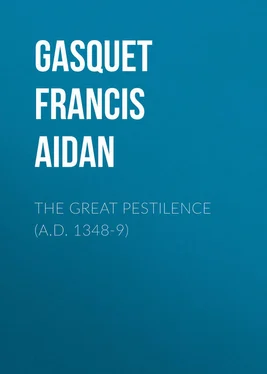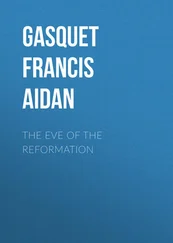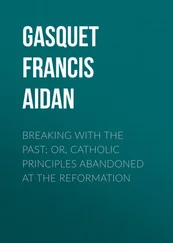Francis Gasquet - The Great Pestilence (A.D. 1348-9)
Здесь есть возможность читать онлайн «Francis Gasquet - The Great Pestilence (A.D. 1348-9)» — ознакомительный отрывок электронной книги совершенно бесплатно, а после прочтения отрывка купить полную версию. В некоторых случаях можно слушать аудио, скачать через торрент в формате fb2 и присутствует краткое содержание. Жанр: foreign_antique, foreign_prose, на английском языке. Описание произведения, (предисловие) а так же отзывы посетителей доступны на портале библиотеки ЛибКат.
- Название:The Great Pestilence (A.D. 1348-9)
- Автор:
- Жанр:
- Год:неизвестен
- ISBN:нет данных
- Рейтинг книги:5 / 5. Голосов: 1
-
Избранное:Добавить в избранное
- Отзывы:
-
Ваша оценка:
- 100
- 1
- 2
- 3
- 4
- 5
The Great Pestilence (A.D. 1348-9): краткое содержание, описание и аннотация
Предлагаем к чтению аннотацию, описание, краткое содержание или предисловие (зависит от того, что написал сам автор книги «The Great Pestilence (A.D. 1348-9)»). Если вы не нашли необходимую информацию о книге — напишите в комментариях, мы постараемся отыскать её.
The Great Pestilence (A.D. 1348-9) — читать онлайн ознакомительный отрывок
Ниже представлен текст книги, разбитый по страницам. Система сохранения места последней прочитанной страницы, позволяет с удобством читать онлайн бесплатно книгу «The Great Pestilence (A.D. 1348-9)», без необходимости каждый раз заново искать на чём Вы остановились. Поставьте закладку, и сможете в любой момент перейти на страницу, на которой закончили чтение.
Интервал:
Закладка:
Having briefly noticed the origin of the great pestilence which ravaged Europe in the fourteenth century, and its progress towards Italy, the story of Gabriel de' Mussi may again be taken up at the point where he describes the flight of the Genoese traders from the Crimea. The narrative has so far anticipated his account only by giving the history of the epidemic in Constantinople and Sicily.
CHAPTER II.
THE EPIDEMIC IN ITALY
The great sickness reached Italy in the early days of 1348. The report at Avignon at the time was that three plague-stricken vessels had put into the port of Genoa in January, whilst from another source it would appear that at the same time another ship brought the contagion from the East to Venice. From these two places the epidemic quickly spread over the entire country. What happened in the early days of this frightful scourge is best told in the actual words of Gabriel de' Mussi, who possessed special means of knowledge, and who has until quite recently been looked upon, but incorrectly, as a passenger by one of the very vessels which brought the plague from the Crimea to Genoa. The history of the progress of the plague may be gathered from the pages of the detailed chronicles, which at that time recorded the principal events in the various large and prosperous cities of the Italian peninsula, as well as from the well-known account of the straits to which Florence was reduced by the sickness, given in the introduction to the "Decameron" of Boccaccio.
On reviewing in detail the testimonies from every land relating to this great calamity, it is impossible to overlook the sameness of the terms in which writers the most diverse in character, and in places far distant from one another, describe what passed before their eyes. It has already been remarked that the imperial historian, John Cantacuzene, in recounting the horrors of the plague in Constantinople, has borrowed from Thucydides. But the same ideas, the very same words, suggest themselves involuntarily to one and all. The simple monastic annalist of the half-buried cloister in Engelberg, the more courtly chronicler of St. Denis, the notary who writes with the dryness and technicalities of his profession, but displays withal a weakness for rhetoric and gossip, littérateurs like Boccaccio, whose forte is narrative, or like Petrarch, delighting in a show of words, the business-like town chronicler of an Italian city, and the author who aspires to the rank of historian, the physician whose interest is professional, even the scribbler who takes this strange theme as the subject for his jingling verse, all speak with such complete oneness of expression that it would almost seem that each had copied his neighbour, and that there is here a fine theme for the scientific amusement known as "investigation of sources." It is only when we come to examine the whole body of evidence that there is borne in upon the mind a realisation of the nature of a calamity which, spreading everywhere, was everywhere the same in its horrors, becoming thus nothing less than a world-wide tragedy, and it is seen that even the phrases of the rhetorician can do no more than rise to the terrible reality of fact.
First in importance, as well as in order of time, comes the testimony of De' Mussi, the substance of which is here given. It so happened that when the ships left Caffa – some bound for Genoa, some for Venice, and some to other parts of the Christian world – a few of the sailors were already infected by the fatal disease. One sick man was enough to infect the whole household, and the corpse as it was carried to the grave brought death to its bearers. "Tell, O Sicily, and ye, the many islands of the sea, the judgments of God. Confess, O Genoa, what thou hast done, since we of Genoa and Venice are compelled to make God's chastisement manifest. Alas! our ships enter the port, but of a thousand sailors hardly ten are spared. We reach our homes; our kindred and our neighbours come from all parts to visit us. Woe to us for we cast at them the darts of death! Whilst we spoke to them, whilst they embraced us and kissed us, we scattered the poison from our lips. Going back to their homes, they in turn soon infected their whole families, who in three days succumbed, and were buried in one common grave. Priests and doctors visiting the sick returned from their duties ill, and soon were numbered with the dead. O, death! cruel, bitter, impious death! which thus breaks the bonds of affection and divides father and mother, brother and sister, son and wife.
"Lamenting our misery, we feared to fly, yet we dared not remain." The terror increased when it was found that even the effects and clothes of the dead were capable of communicating the disease. This was seen in the case of four soldiers at a place near Genoa. Returning to their camp they carried back with them a woollen bed-covering they had found in a house at Rivarolo, on the sea-coast, where the sickness had swept away the entire population. The night following the four slept under the coverlet, and in the morning all were found to be dead. At Genoa the plague spared hardly a seventh part of the population. At Venice it is said that more than seventy died out of every hundred, and out of four-and-twenty excellent doctors twenty were soon carried off by the sickness.
"But as an inhabitant I am asked to write more of Piacenza so that it may be known what happened there in the year 1348. Some Genoese who fled from the plague raging in their city betook themselves hither. They rested at Bobbio, and there sold the merchandise they had brought with them. The purchaser and their host, together with all his family and many neighbours, were quickly stricken with the sickness and died. One of these, wishing to make his will, called a notary, his confessor, and the necessary witnesses. The next day all these were buried together. So greatly did the calamity increase that nearly all the inhabitants of Bobbio soon fell a prey to the sickness, and there remained in the town only the dead.
"In the spring of 1348 another Genoese infected with the plague came to Piacenza. He sought out his friend Fulchino della Croce, who took him into his house. Almost immediately afterwards he died, and the said Fulchino was also quickly carried off with his entire family and many of his neighbours. In a brief space the plague was rife throughout the city. I know not where to begin; everywhere there was weeping and mourning. So great was the mortality that men hardly dared to breathe. The dead were without number, and those who still lived gave themselves up as lost, and prepared for the tomb.
"The cemeteries failing, it was necessary to dig trenches to receive the bodies of the dead. It frequently happened that a husband and wife, a father and son, a mother and daughter – nay, whole families – were cast together in the same pit.
"It was the same in the neighbouring towns and villages. One Oberto di Sasso, who had come one day from an infected place to the church of the Friars Minor to make his will, called thither a notary, witnesses, and neighbours. All these, together with others, to the number of more than sixty, died within a short space of time. Also the religious man, friar Sifredo de' Bardi, of the convent and order of Preachers, a man of prudence and great learning, who had visited our Lord's sepulchre, died with twenty-three other members of his order and convent. Also the learned and virtuous friar Bertolin Coxadocha, of Piacenza, of the order of Minorites, with four-and-twenty members of his community was carried off. So too of the convent of Augustinian Hermits – seven; of the Carmelites – seven; of the Servites of Mary – four, and more than sixty dignitaries and rectors of churches in the city and district of Piacenza died. Of nobles, too, many; of young people a vast number."
Читать дальшеИнтервал:
Закладка:
Похожие книги на «The Great Pestilence (A.D. 1348-9)»
Представляем Вашему вниманию похожие книги на «The Great Pestilence (A.D. 1348-9)» списком для выбора. Мы отобрали схожую по названию и смыслу литературу в надежде предоставить читателям больше вариантов отыскать новые, интересные, ещё непрочитанные произведения.
Обсуждение, отзывы о книге «The Great Pestilence (A.D. 1348-9)» и просто собственные мнения читателей. Оставьте ваши комментарии, напишите, что Вы думаете о произведении, его смысле или главных героях. Укажите что конкретно понравилось, а что нет, и почему Вы так считаете.












